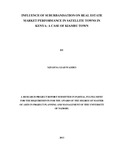| dc.description.abstract | This research project report is a study of how suburbanisation influences the performance of
real estate market within satellite towns in Kenya. This is through the study of how four
components of suburbanisation namely land use patterns, land values, cost of housing and
road infrastructure influences the real estate market. Kiambu town, which has experienced an
increase in real estate activities in the recent past, has been used as a case. The objective of
the study was to investigate the influence of suburbanisation of satellite towns on the real
estate market. The research project report gives a background on suburbanisation with its
purpose being to find out the influence of suburbanisation on the performance of the real
estate market through change ofland values, land use, cost of housing and road infrastructure.
The major significance of this study to the stakeholders is to help in making decision related
to investment in real estate in the suburbanising satellite towns. The study covers Kiambu
town, which is the headquarters of Kiambu County. The project looks into the concept of
suburbanisation and is guided by the ecological approach and the sociologists' theory of
suburbanisation. The methodology of the research used is descriptive survey research design
with registered valuers, estate agents, government land valuers in the Ministry of Lands
offices in Kiambu, the town planner in Kiambu as well as residents of Kiambu Town being
the target population. Purposive sampling technique was used with both primary and
secondary instruments data sources, which were piloted before the actual data collection. The
primary sources included interviews and questionnaires, while the analysis and review of
books, journals, magazines and reports of various authorities formed the core of secondary
data. Raw data was collected and the researcher pre-processed it to eliminate unwanted and
unusable data which could have been contradictory or ambiguous, developed a coding
scheme by creating codes from the responses which was then summarized and analysed using
Statistical Package of Social Science (SPSS). The data was analysed in descriptive
perspectives and a summary of findings given. The research found that as components of
suburbanisation; land use, land values, cost of housing and road infrastructure development
affect the performance of the real estate market positively. The increase/ growth of these
components lead to a vibrant market with increased transactions. Cost of housing was
indicated as the one with a highest influence by 37.2% of the respondents, followed by land
values at 20.4%, road infrastructure at 16.8% and finally changes in land use by 15.9%. In
conclusion, the research found that these four components influence demand, a major aspect
that drives the real estate market performance. The study recommends the development of an
Integrated Development Plan to address the issues of zoning for different land use to
harmonize the different land users, and to also specifically cater for agricultural land use
which is under threat from residential land use. This will also act as a regulation to the
market. It also recommends proper planning and opening up of areas by road networks. | en |

